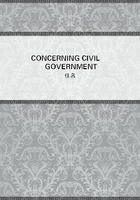
第49章
193. But granting that the conqueror, in a just war, has a right to the estates, as well as power over the persons of the conquered, which, it is plain, he hath not, nothing of absolute power will follow from hence in the continuance of the government. Because the descendants of these being all free men, if he grants them estates and possessions to inhabit his country, without which it would be worth nothing, whatsoever he grants them they have so far as it is granted property in; the nature whereof is, that, without a man's own consent, it cannot be taken from him.
194. Their persons are free by a native right, and their properties, be they more or less, are their own, and at their own dispose, and not at his; or else it is no property. Supposing the conqueror gives to one man a thousand acres, to him and his heirs for ever; to another he lets a thousand acres, for his life, under the rent of L50 or L500 per annum. Has not the one of these a right to his thousand acres for ever, and the other during his life, paying the said rent? And hath not the tenant for life a property in all that he gets over and above his rent, by his labour and industry, during the said term, supposing it be double the rent? Can any one say, the king, or conqueror, after his grant, may, by his power of conqueror, take away all, or part of the land, from the heirs of one, or from the other during his life, he paying the rent? Or, can he take away from either the goods or money they have got upon the said land at his pleasure? If he can, then all free and voluntary contracts cease, and are void in the world; there needs nothing but power enough to dissolve them at any time, and all the grants and promises of men in power are but mockery and collusion. For can there be anything more ridiculous than to say, I give you and yours this for ever, and that in the surest and most solemn way of conveyance can be devised, and yet it is to be understood that I have right, if I please, to take it away from you again to-morrow?
195. I will not dispute now whether princes are exempt from the laws of their country, but this I am sure, they owe subjection to the laws of God and Nature. Nobody, no power can exempt them from the obligations of that eternal law. Those are so great and so strong in the case of promises, that Omnipotency itself can be tied by them.
Grants, promises, and oaths are bonds that hold the Almighty, whatever some flatterers say to princes of the world, who, all together, with all their people joined to them, are, in comparison of the great God, but as a drop of the bucket, or a dust on the balance-inconsiderable, nothing!
196. The short of the case in conquest, is this: The conqueror, if he have a just cause, has a despotical right over the persons of all that actually aided and concurred in the war against him, and a right to make up his damage and cost out of their labour and estates, so he injure not the right of any other. Over the rest of the people, if there were any that consented not to the war, and over the children of the captives themselves or the possessions of either he has no power, and so can have, by virtue of conquest, no lawful title himself to dominion over them, or derive it to his posterity; but is an aggressor, and puts himself in a state of war against them, and has no better a right of principality, he, nor any of his successors, than Hingar, or Hubba, the Danes, had here in England, or Spartacus, had be conquered Italy, which is to have their yoke cast off as soon as God shall give those under their subjection courage and opportunity to do it. Thus, notwithstanding whatever title the kings of Assyria had over Judah, by the sword, God assisted Hezekiah to throw off the dominion of that conquering empire. "And the Lord was with Hezekiah, and he prospered; wherefore he went forth, and he rebelled against the king of Assyria, and served him not" (II Kings 18. 7). Whence it is plain that shaking off a power which force, and not right, hath set over any one, though it hath the name of rebellion, yet is no offence before God, but that which He allows and countenances, though even promises and covenants, when obtained by force, have intervened. For it is very probable, to any one that reads the story of Ahaz and Hezekiah attentively, that the Assyrians subdued Ahaz, and deposed him, and made Hezekiah king in his father's lifetime, and that Hezekiah, by agreement, had done him homage, and paid him tribute till this time.